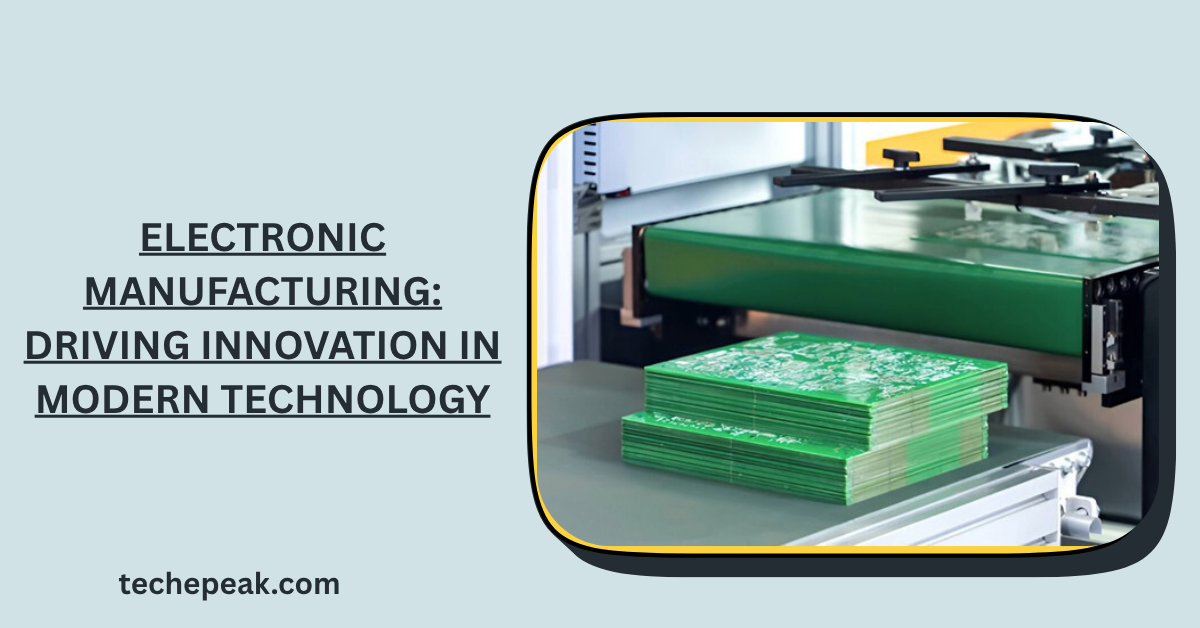Electronic manufacturing is the backbone of today’s technological world, encompassing the design, production, and assembly of electronic components and devices. From consumer electronics to industrial systems, medical instruments, and telecommunications, electronic manufacturing ensures that advanced technologies are brought to life efficiently and reliably. This process involves a combination of engineering expertise, precision machinery, and quality control standards that guarantee consistent and high-performance electronic products.
Table of Contents
ToggleUnderstanding Electronic Manufacturing
Electronic manufacturing covers a wide range of processes that turn electronic designs into functional products. At its core, it involves printed circuit board (PCB) fabrication, component assembly, soldering, testing, and packaging. These steps must be executed with precision to ensure the reliability and functionality of the final product.
Modern electronic manufacturing heavily relies on automated systems, including surface mount technology (SMT) machines, pick-and-place robots, and reflow ovens. These tools enable manufacturers to assemble complex electronics efficiently, minimize human error, and maintain high production speeds. Furthermore, advanced inspection techniques like automated optical inspection (AOI) and X-ray testing ensure that every component is correctly placed and soldered.
Another key aspect of electronic manufacturing is flexible production. Manufacturers must be capable of handling a variety of PCB types, from rigid and multilayer boards to flexible and rigid-flex designs. Flex PCBs, in particular, are widely used in applications where space constraints or mechanical flexibility are critical, such as wearable electronics, medical devices, and automotive systems.
Advantages of Modern Electronic Manufacturing
One of the primary benefits of electronic manufacturing is scalability. Companies can produce small batches for prototyping or large-scale production runs without compromising quality. This flexibility allows businesses to respond quickly to market demands and technological advancements.
Quality control is another significant advantage. Rigorous testing at each stage of production ensures that the final products meet performance, safety, and durability standards. High-quality electronic manufacturing reduces failure rates, improves product lifespan, and enhances customer satisfaction.
Efficiency and cost-effectiveness are also key benefits. Automation, streamlined workflows, and supply chain integration reduce labor costs and production time while maintaining precision. This combination allows manufacturers to offer competitive pricing without sacrificing quality.
Applications of Electronic Manufacturing
Electronic manufacturing serves diverse industries. In the consumer electronics sector, it supports the production of smartphones, tablets, laptops, and smart home devices. These products require miniaturization, high component density, and precise assembly, all achievable through modern manufacturing techniques.
In the medical industry, electronic manufacturing ensures the reliable production of diagnostic tools, wearable health monitors, and portable medical devices. Accuracy, reliability, and compliance with regulatory standards are crucial in this sector.
The automotive industry also benefits significantly from electronic manufacturing. Advanced driver-assistance systems (ADAS), infotainment units, and sensor systems rely on high-quality PCBs and precise assembly processes to function safely and effectively.
Other industries, such as aerospace, telecommunications, and industrial automation, depend on robust electronic manufacturing capabilities to produce control systems, network devices, and machinery electronics that operate reliably under demanding conditions.
Choosing the Right Electronic Manufacturing Partner
Selecting the right partner for electronic manufacturing is vital for ensuring quality, efficiency, and timely delivery. Working with an experienced supplier that offers comprehensive services—from PCB design and assembly to final testing—ensures that products meet industry standards and customer expectations.
For companies requiring specialized solutions like flexible PCBs, collaborating with a reliable flex PCB supplier provides access to skilled engineers, advanced production equipment, and expertise in handling complex PCB assemblies. This partnership guarantees that your electronic products are manufactured efficiently, function reliably, and reach the market with confidence.
Modern electronic manufacturing empowers businesses to innovate and stay competitive. By leveraging advanced technologies, precision assembly processes, and trusted suppliers, companies can produce high-quality electronics that meet the demands of today’s fast-paced market.












